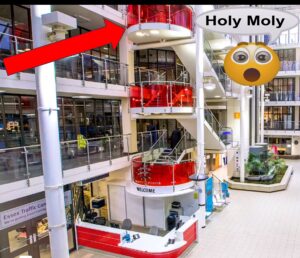Essex County Council’s HQ is a big place. It needs to be, to be the base for around 8,000 staff. The office is organised by department, and us Data Analysts tend to hang around the first of five floors. Not to brag, but I happen to live a five-minute walk away from the office, so my commute is usually one flight of stairs, accompanied by a smoothie I’ve made at home. It’s not a bad life.
So, when Sally Davey, a Team Manager in Adult Social Care, said she would meet me on the third floor prior to the start of my day shadowing her team, I was slightly nervous. I had forgotten such a floor existed, and my legs were not used to such a demanding hike up the stairs. Armed with a banana for energy, I began the trek to the third floor, ready to begin a day of experiencing what it was like to be very close to the frontline of adult social care with the Incoming team.

I soon realised that I needed the banana not for the gruelling stair marathon, but for the energy required to keep up with the pace of Sally’s team. I was introduced to Pat, a Community Support Worker in her team, and I spent the day watching her respond to a multitude of requests. Often, one incoming case could require several calls to providers, family, friends, and the adult themselves. After every call, Pat had to document absolutely everything that was discussed, to the minute. It’s not just calls she has to document, though, as Pat uses a variety of interfaces to complete every case; from Teams, to the Internet, she has to document everything she uses to make decisions. The free text fields in our system are endless, and Pat’s attention to written detail made me think beyond the structured, automated, tables that I am so used to seeing as an analyst.
I then sat with Nurgul, a social worker who was taking calls that come into the Contact Centre. She had to assess both the needs of the adult and the associated risk to their health and wellbeing, to assign a priority level to the request. Her decision impacts what action other colleagues within the process take. If a case is of the highest priority, the associated team will not leave until risk to the adult is completely minimised.
Data teams often talk about decision-making in a strategic sense, most of our work informs future thinking, and whilst this is important, I now recognise that operational decisions are made every day in teams like Sally’s. Decisions like adding in an extra visit per week to an adult’s support plan can, and do, make the difference they needed to live in their communities, supported and fulfilled. These decisions are essentially the scaffolding behind the data tables we analysts see and use, all the way down on the first floor.
Thus, it’ll be no surprise to hear that I found my time with Sally, Pat, Nurgul and the team to be immensely helpful. I came out of it able to contextualise the data I analyse, which is something that we all should be able to learn to do.
Data Analysts at ECC are encouraged to diversify our learning and development. For some, that may mean spending time every week running through a technical course. Others may choose to attend webinars and conferences about project management. For myself, shadowing an operational team pieced together what was missing in my own development and expanded my ideas on how we deliver impact to the organisation, particularly operationally. With new AI technology showing promising potential in the social care space, I’m excited to see whether it could be used to lift the admin burden from teams like Sally’s, so they can spend even more time making decisions that benefit residents in Essex.
A huge thank you to Sally Davey for organising my day with her team, and to Pat Choto and Nurgul Tugcu for letting me sit and watch them work all day. One final thing I learnt: next time, take the lift.
1 comment
Comment by Lou Thomas posted on
Great blog Katy!